中考英语语法专题篇介词
- 格式:ppt
- 大小:130.50 KB
- 文档页数:10
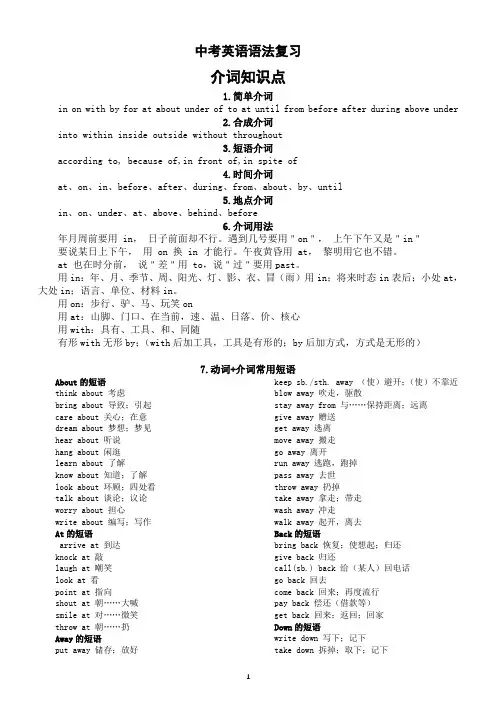
中考英语语法复习介词知识点1.简单介词in on with by for at about under of to at until from before after during above under2.合成介词into within inside outside without throughout3.短语介词according to, because of,in front of,in spite of4.时间介词at、on、in、before、after、during、from、about、by、until5.地点介词in、on、under、at、above、behind、before6.介词用法年月周前要用 in,日子前面却不行。
遇到几号要用"on",上午下午又是"in"要说某日上下午,用 on 换 in 才能行。
午夜黄昏用 at,黎明用它也不错。
at 也在时分前,说"差"用 to,说"过"要用past。
用in:年、月、季节、周、阳光、灯、影、衣、冒(雨)用in;将来时态in表后;小处at,大处in;语言、单位、材料in。
用on:步行、驴、马、玩笑on用at:山脚、门口、在当前,速、温、日落、价、核心用with:具有、工具、和、同随有形with无形by;(with后加工具,工具是有形的;by后加方式,方式是无形的)7.动词+介词常用短语About的短语think about 考虑bring about 导致;引起care about 关心;在意dream about 梦想;梦见hear about 听说hang about 闲逛learn about 了解know about 知道;了解look about 环顾;四处看talk about 谈论;议论worry about 担心write about 编写;写作At的短语arrive at 到达knock at 敲laugh at 嘲笑look at 看point at 指向shout at 朝……大喊smile at 对……微笑throw at 朝……扔Away的短语put away 储存;放好keep sb./sth. away (使)避开;(使)不靠近blow away 吹走,驱散stay away from 与……保持距离;远离give away 赠送get away 逃离move away 搬走go away 离开run away 逃跑,跑掉pass away 去世throw away 扔掉take away 拿走;带走wash away 冲走walk away 起开,离去Back的短语bring back 恢复;使想起;归还give back 归还call(sb.) back 给(某人)回电话go back 回去come back 回来;再度流行pay back 偿还(借款等)get back 回来;返回;回家Down的短语write down 写下;记下take down 拆掉;取下;记下1break down 停止运转;(机器等)出故障turn down 把调低;关小;拒绝calm down 冷静下来cut down 砍倒;缩减die down 减弱;逐渐平息fall down 倒塌;跌倒lie down 躺下pull down 拆除;摧毁put down 放下;记下sit down 坐下slow down (使)减速;(使)放松For的短语search for 搜索;查找thanks for 因……而感激die for 为而死care for 照顾;关怀look for 寻找leave for 动身去pay for 为……付钱stand for 代表prepare for 为……做准备wait for 等待Off的短语burn off 燃烧turn off 关掉cut off 切断;中断break off 突然中止;中断give off 散发;释放get off 下车keep off (使)不接近;远离go off 熄灭;响起put off 推迟;拖延pay off 还清(欠款);成功see off 送行run off 跑掉;逃跑show off 炫耀;显摆set off 动身;启程;使爆炸take off 脱下衣服;(飞机等)起飞shut off 关闭;停止运转On的短语hold on 等一等(别挂电话)pass on 传递keep on 继续(进行)try on 试穿take on 承担;呈现work on 从事;忙于agree on 对意见……一致come on 加油carry on 继续call on 访问;拜访depend on 依靠;依赖;视……而定;取决于decide on 决定;选定get on 上车;进展go on 继续live/feed on 以……为食;靠……谋生put on 穿上;增重;上演turn on 打开Up的短语drive up 开车end up 最终;结束;到头来fill up 装满;填补fix up 修理give up 放弃make up 编造;化妆pick up 接(某人);捡起look up 查阅;查找set up 建立;创立;建造show up 出席;露面take up 开始做;从事;占据stay up 不睡觉;熬夜turn up 调高(音量);出现wake up 睡醒;醒来bring up 养育;提出grow up 成长;长大cheer up 使……振奋;hurry up 赶紧clean up 把(……)打扫干净;put up 张贴;举起;搭建cut up 切碎stand up 站起来dress up 穿上盛装;装扮With的短语deal with 处理;应付play with 和……玩耍agree with 赞同;持相同意见catch up with 赶上(或超过)begin/start with 以……开始come up with 提出;想出(主意、回答等)communicate with 和……交流end up with 以……结束connect with 与……联系talk with 和……交谈part with 放弃;舍弃(尤其不舍得的东西);与……分开get along with 和……相处2。
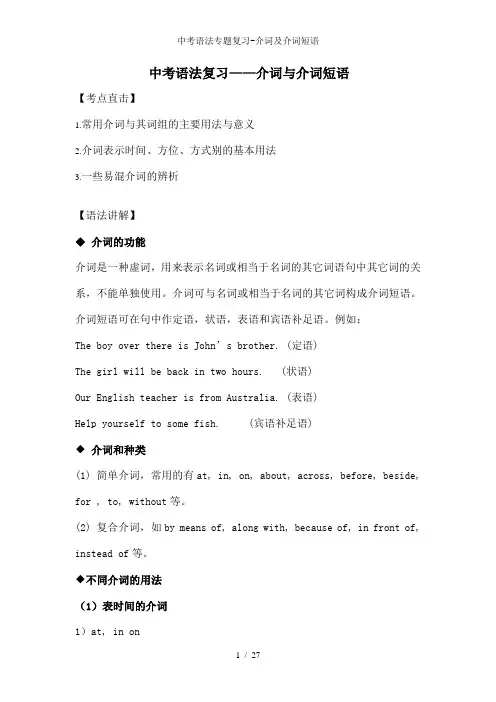
中考语法复习——介词与介词短语【考点直击】1.常用介词与其词组的主要用法与意义2.介词表示时间、方位、方式别的基本用法3.一些易混介词的辨析【语法讲解】◆介词的功能介词是一种虚词,用来表示名词或相当于名词的其它词语句中其它词的关系,不能单独使用。
介词可与名词或相当于名词的其它词构成介词短语。
介词短语可在句中作定语,状语,表语和宾语补足语。
例如:The boy over there is John’s brother. (定语)The girl will be back in two hours. (状语)Our English teacher is from Australia. (表语)Help yourself to some fish. (宾语补足语)◆介词和种类(1) 简单介词,常用的有at, in, on, about, across, before, beside, for , to, without等。
(2) 复合介词,如by means of, along with, because of, in front of, instead of等。
◆不同介词的用法(1)表时间的介词1)at, in on表示时间点用at。
例如:at six o’clock, at noon, at midnight。
表示在某个世纪,某年,某月,某个季节以与早晨,上午,下午,晚上时,用in。
例如:in the nineteenth century, in 2002, in may, in winter, in the morning, in the afternoon等。
表示具体的某一天和某一天的上午,下午,晚上时,用on。
例如:on Monday, on July 1st, on Sunday morning 等。
2)since, after由since和after 引导的词组都可表示从过去某一点开始的时段,但since词组表示的时段一直延续到说话的时刻,因而往往要与现在完成时连用。
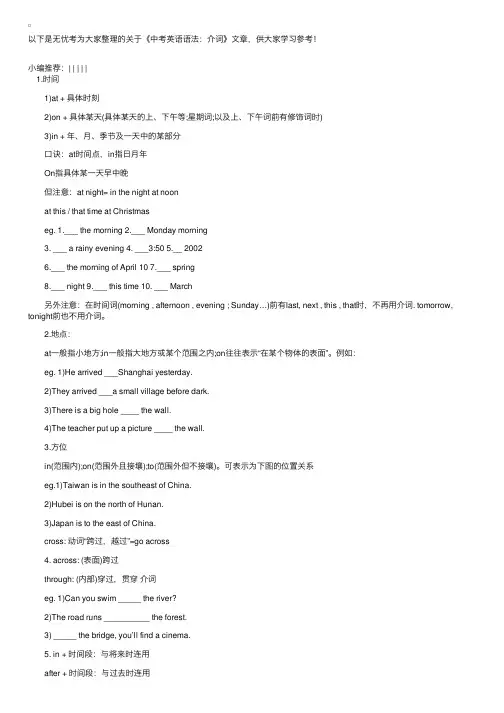
以下是⽆忧考为⼤家整理的关于《中考英语语法:介词》⽂章,供⼤家学习参考!⼩编推荐:| | | | | 1.时间 1)at + 具体时刻 2)on + 具体某天(具体某天的上、下午等;星期词;以及上、下午词前有修饰词时) 3)in + 年、⽉、季节及⼀天中的某部分 ⼝诀:at时间点,in指⽇⽉年 On指具体某⼀天早中晚 但注意:at night= in the night at noon at this / that time at Christmas eg. 1.___ the morning 2.___ Monday morning3. ___ a rainy evening4. ___3:505.__ 20026.___ the morning of April 107.___ spring 8.___ night 9.___ this time 10. ___ March 另外注意:在时间词(morning , afternoon , evening ; Sunday…)前有last, next , this , that时,不再⽤介词. tomorrow, tonight前也不⽤介词。
2.地点: at⼀般指⼩地⽅;in⼀般指⼤地⽅或某个范围之内;on往往表⽰“在某个物体的表⾯”。
例如: eg. 1)He arrived ___Shanghai yesterday. 2)They arrived ___a small village before dark. 3)There is a big hole ____ the wall. 4)The teacher put up a picture ____ the wall. 3.⽅位 in(范围内);on(范围外且接壤);to(范围外但不接壤)。
可表⽰为下图的位置关系 eg.1)Taiwan is in the southeast of China. 2)Hubei is on the north of Hunan. 3)Japan is to the east of China. cross: 动词“跨过,越过”=go across 4. across: (表⾯)跨过 through: (内部)穿过,贯穿介词 eg. 1)Can you swim _____ the river? 2)The road runs __________ the forest. 3) _____ the bridge, you’ll find a cinema. 5. in + 时间段:与将来时连⽤ after + 时间段:与过去时连⽤ 但after + 时间点:可与将来时连⽤。
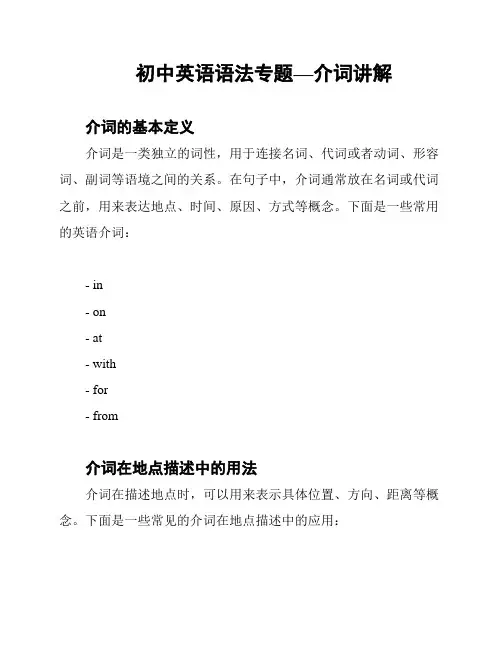
初中英语语法专题—介词讲解介词的基本定义介词是一类独立的词性,用于连接名词、代词或者动词、形容词、副词等语境之间的关系。
在句子中,介词通常放在名词或代词之前,用来表达地点、时间、原因、方式等概念。
下面是一些常用的英语介词:- in- on- at- with- for- from介词在地点描述中的用法介词在描述地点时,可以用来表示具体位置、方向、距离等概念。
下面是一些常见的介词在地点描述中的应用:- in:用于表示在某个范围之内的位置,例如 "in the room"(在房间里),"in the park"(在公园里)。
- on:用于表示在表面、平台或者位置上的状态,例如 "on the table"(在桌子上),"on the bus"(在公交车上)。
- at:用于表示在某个具体位置或者地点,例如 "at the cinema"(在电影院),"at school"(在学校)。
- to:用于表示朝向某个位置的移动,例如 "go to the park"(去公园)。
介词在时间描述中的用法介词在描述时间时,可以用来表示具体时间、时间段等概念。
下面是一些常见的介词在时间描述中的应用:- at:用于表示具体的时间点,例如 "at 7 o'clock"(在7点钟)。
- on:用于表示具体的日期或者星期几,例如 "on Monday"(星期一),"on January 1st"(1月1日)。
- in:用于表示较长的时间段或者某一个时间段内,例如 "inthe morning"(早上),"in July"(在七月)。
介词在原因描述中的用法介词在描述原因时,可以用来表示某事的起因或者原因。
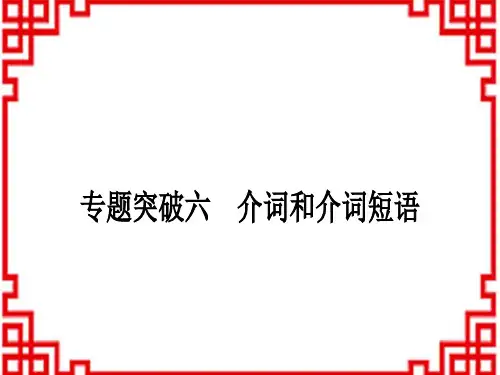
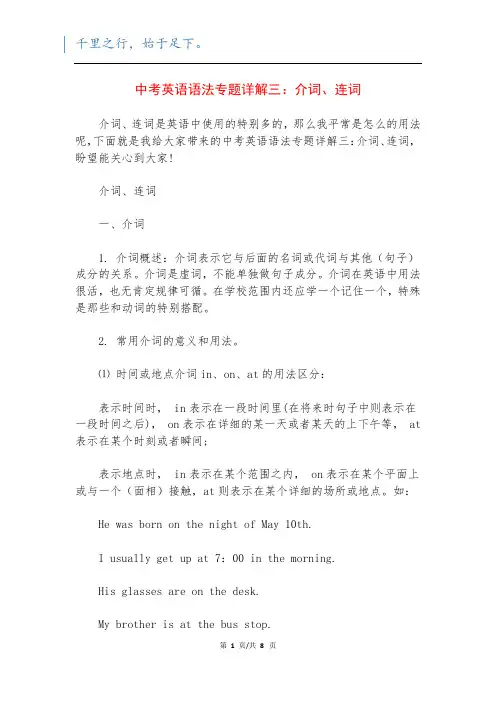
中考英语语法专题详解三:介词、连词介词、连词是英语中使用的特别多的,那么我平常是怎么的用法呢,下面就是我给大家带来的中考英语语法专题详解三:介词、连词,盼望能关心到大家!介词、连词一、介词1. 介词概述:介词表示它与后面的名词或代词与其他(句子)成分的关系。
介词是虚词,不能单独做句子成分。
介词在英语中用法很活,也无肯定规律可循。
在学校范围内还应学一个记住一个,特殊是那些和动词的特别搭配。
2. 常用介词的意义和用法。
⑴ 时间或地点介词in、on、at的用法区分:表示时间时, in表示在一段时间里(在将来时句子中则表示在一段时间之后), on表示在详细的某一天或者某天的上下午等, at 表示在某个时刻或者瞬间;表示地点时, in表示在某个范围之内, on表示在某个平面上或与一个(面相)接触,at则表示在某个详细的场所或地点。
如:He was born on the night of May 10th.I usually get up at 7:00 in the morning.His glasses are on the desk.My brother is at the bus stop.⑵ after与in表示时间的用法区分:“after+(详细时刻/从句)”表示“在时刻之后”常用于一般过去时态;“in+(一段时间)”表示“在(多久)之后”,常用于将来时态。
如:He said that he would come back after 6:00.My father is coming back from Astralia in about a month.⑶ since与for表示时间的用法区分:“since+(详细时刻/that-从句)”表示“自从起始终到现在”,“for +(一段时间)”表示“持续一段时间”,都常用于完成时态;如:My father has worked in this factory since 1970.My father has worked in this factory for over 30 years.⑷ by、in与with表示方式的用法区分:都可以表示“工具、手段”,但是by主要表示“乘坐”某个交通工具或“以方式”,在被动句中可以表示动作的执行者;in表示“使用”某种语言/文字,with表示“使用”某个详细的工具、手段。
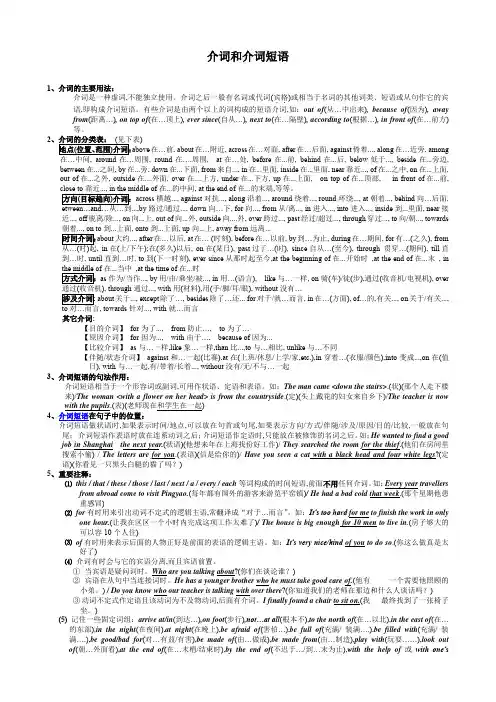
介词和介词短语1、介词的主要用法:介词是一种虚词,不能独立使用。
介词之后一般有名词或代词(宾格..)或相当于名词的其他词类、短语或从句作它的宾语,即构成介词短语。
有些介词是由两个以上的词构成的短语介词,如:out of(从…中出来), because of(因为), away from(距离…), on top of(在…顶上), ever since(自从…), next to(在…隔壁), according to(根据…), in front of(在…前方)等。
2)above在…前, about在…附近, across在…对面, after在…后面, against倚着..., along在…近旁, among周围, round在….周围, at在…处, before在...前, behind在...后, below低于..., beside在...旁边, between在...之间, by在...旁, down在...下面, from来自..., in在...里面, inside在...里面, near靠近..., of在...之中, on在...上面, out of在...之外, outside在....外面, over在....上方, under在...下方, up在...上面, on top of在...顶部, in front of在...前,在...的中间, at the end of在...的末端,等等。
across横越..., against对抗..., along沿着..., around绕着..., round环绕..., at朝着..., behind向…后面,...,by路过/通过..., down向…下, for向..., from从/离..., in进入..., into进入..., inside到...里面, near接近..., off脱离/除..., on向...上, out of向...外, outside向....外, over跨过..., past经过/超过..., through穿过..., to向/朝..., towards 到...上面, onto到...上面, up向...上, away from远离...about大约..., after在…以后, at在… (时刻), before在…以前, by到…为止, during在…期间, for有…(之久), from, in在(上/下午);在(多久)以后, on在(某日), past过了…(时), since自从…(至今), through 贯穿…(期间), till直到…时, until直到…时, to到(下一时刻), ever since从那时起至今,at the beginning of在...开始时,at the end of在...末, in 在...当中,at the time of在...时as作为/当作..., by用/由/乘坐/被..., in用…(语言), like与…一样, on骑(车)/徒(步),通过(收音机/电视机), over), through通过..., with用(材料),用(手/脚/耳/眼), without没有…about关于..., except除了…, besides除了…还... for对于/就…而言, in在…(方面), of…的,有关..., on关于/有关...,, towards针对..., with就…而言其它介词:【目的介词】for为了..., from防止…,to为了…【原因介词】for因为..., with由于…, because of因为...【比较介词】as与…一样,like象…一样,than比...,to与…相比, unlike与…不同【伴随/状态介词】against和…一起(比赛),at在(上班/休息/上学/家,etc.),in穿着…(衣服/颜色),into变成...,on在(值日), with与…一起,有/带着/长着..., without没有/无/不与…一起3、介词短语的句法作用:介词短语相当于一个形容词或副词,可用作状语、定语和表语。
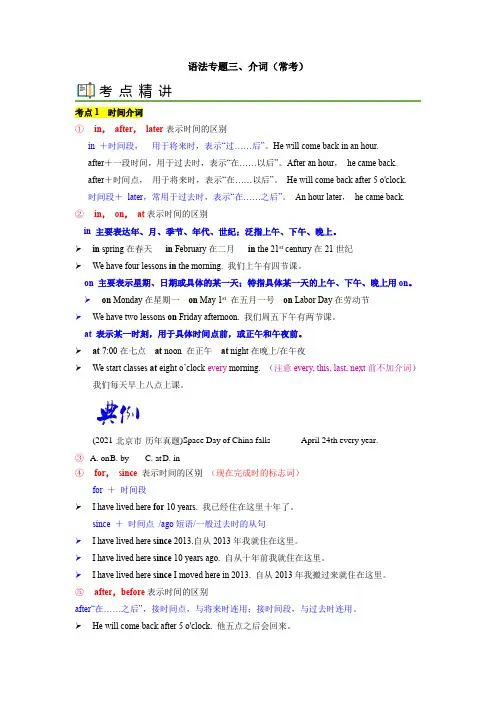
语法专题三、介词(常考)考点1 时间介词①in,after,later表示时间的区别in +时间段,用于将来时,表示“过……后”。
He will come back in an hour.after+一段时间,用于过去时,表示“在……以后”。
After an hour,he came back.after+时间点,用于将来时,表示“在……以后”。
He will come back after 5 o'clock.时间段+later,常用于过去时,表示“在……之后”。
An hour later,he came back.②in,on,at表示时间的区别in 主要表达年、月、季节、年代、世纪;泛指上午、下午、晚上。
➢in spring在春天in February在二月in the 21st century在21世纪➢We have four lessons in the morning. 我们上午有四节课。
on 主要表示星期、日期或具体的某一天;特指具体某一天的上午、下午、晚上用on。
➢on Monday在星期一on May 1st在五月一号on Labor Day在劳动节➢We have two lessons on Friday afternoon. 我们周五下午有两节课。
at 表示某一时刻,用于具体时间点前,或正午和午夜前。
➢at 7:00在七点at noon 在正午at night在晚上/在午夜➢We start classes at eight o’clock every morning. (注意every, this, last, next前不加介词)我们每天早上八点上课。
(2021·北京市·历年真题)Space Day of China falls ______ April 24th every year.③ A. on B. by C. at D. in④for,since 表示时间的区别(现在完成时的标志词)for +时间段➢I have lived here for 10 years. 我已经住在这里十年了。

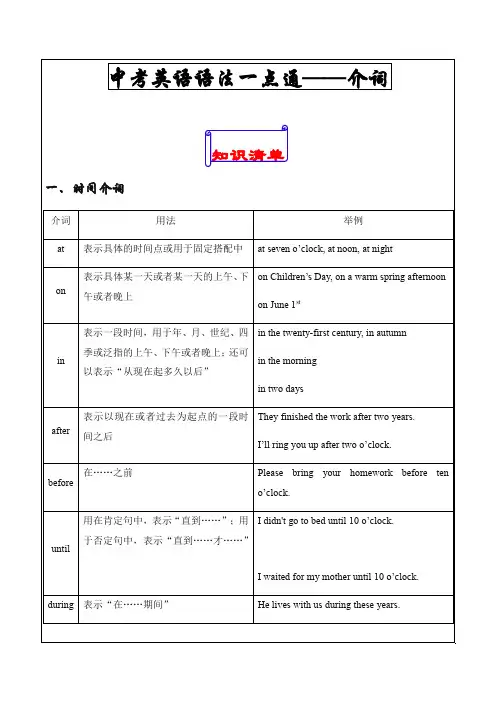

中考英语语法大全——介词和介词短语一、介词的定义介词又叫前置词,在句子中不能单独使用,总是与其后面的名词、代词或相当于名词的词一起构成介词短语,表达多种不同的意义。
介词具有以上3大特点:1.介词后面的词作介词的宾语,被称作介词宾语。
2.介词后面的代词需用宾格形式。
3.介词后面的动词要用动名词形式。
二、介词的分类介词按照构成形式可以分为四种。
(1)简单介词简单介词是指由一个单词构成的介词。
如:about,above,after,at,between,before,by,for,from,like,in,of 等。
Can you come to my party on Saturday afternoon?(2)合成介词合成介词是指由两个单词合在一起构成的介词。
如:inside,into,throughout,upon,within,without等。
I don’t know what I’d do without you.(3)双重介词词双重介词是指由两个介词搭配在一起构成的介词。
如:except for, from behind, up until等。
Her house is good except for the door.(4)短语介词短语介词是指两个或两个以上的词组合构成的介词,在意义和作用上相当于一个简单的介词。
如:according to, at the end of, in front of等。
Because of the bad weather, we couldn’t see anything below.介词根据其意义可分为表示时间的介词、表示方位空间的介词、表示其他意义的介词。
(1)表示时间的介词常用的有:(2)表示方位空间的介词常用的有:(3)表示其他意义的介词常用的有:三、介词的位置1.介词在句中的通常位置在句子中介词一般放在名词(或代词宾格)之前。
In summer, we often slept under the stars.2.介词在句中的其他位置(1)介词的宾语为疑问词时,介词可以根据情况置于句首或句末。
中考英语语法之介词与连词应用一、介词的基本用法介词是一种十分常见的词类,它可以在句子中与其他词语搭配使用,起到表示位置、方向、时间、原因、方式等作用。
下面是介词的一些基本用法。
1. 表示位置方向介词可以用来表示物体或人的位置和方向。
例如:- The book is on the table.(书在桌子上。
)- He ran into the room.(他跑进了房间。
)2. 表示时间介词可以表达时间的概念,如具体时间、时间段、日期等。
例如:- I will go to the park in the afternoon.(下午我将去公园。
)- They went on a trip during the summer vacation.(在暑假期间,他们去旅行了。
)- The New Year's Day is on January 1st.(元旦在1月1日。
)3. 表示原因介词可以用来表示某事发生的原因或理由。
例如:- She failed the exam because of her laziness.(她考试不及格是因为懒惰。
)- He apologized to me for his mistake.(他因为错误向我道歉。
)4. 表示方式介词可以表达某种行为或方式。
例如:- She sings with joy.(她带着喜悦地唱歌。
)- He solved the problem by thinking carefully.(他通过仔细思考解决了这个问题。
)二、连词的基本用法连词是用来连接各种词组、短语或句子的词类,使得语言表达更加流畅和连贯。
下面是连词的一些基本用法。
1. 表示并列关系连词可以把两个或更多的相同类型的词、短语或句子连接起来,表示并列关系。
常见的连词有and、but、or等。
例如:- I like apples and oranges.(我喜欢苹果和橙子。
)- She is smart but lazy.(她聪明但是懒惰。
介词●介词短语介词是一种用来表示词与词,词与句之间的关系的词,在句中不能单独作为句子成分。
介词后一般有名词、代词、相当于名词的其他词、短语或从句作为它的宾语。
介词和它的宾语构成介词词组,用来修饰名词、动词、形容词与副词等各种词类,它的位置通常在所修饰的对象后面。
e.g.Cherries are in season now. 现在正是樱桃生产的季节。
名词介词短语Eggs are sold by the dozen. 鸡蛋是论打出售的。
动词介词短语The box is full of chocolates. 盒子里装满了巧克力。
形容词介词短语He'll return tomorrow at the latest. 他最晚明天回来。
副词介词短语●表示时间1)at, in, on 在...时→at表示“点”→in表示长时间(如世纪、朝代、时代、年、季节、月等)→on标示出特定日期e.g.at seven o'clockin the 21st century in summer in Mayon 10th October on Teachers’ Day on Monday on a cold winter morning注意:在last, next, this, that, some, every等词之前一律不用介词。
2)in, after 在...之后→“in + 一段时间”表示将来的一段时间以后→“in + 将来时间点”表示将来的某一时刻以后e.g.My mother will be back in half an hour.My mother will be back after four o’clock.3)from, since 自从→from仅说明什么时候开始,不说明某动作或情况持续多久。
→since表示某动作或情况持续至说话时刻,通常用完成时。
e.g.We began to learn English from 2010.We have been here since 2020.●表示空间1)at, in, on, to, for→at表示在小地方: at the cinema, at the airport→in表示在大地方: in Shanghai→in表示“在...范围之内”: in the world, in the shop→on表示“在...上面”: on the desk, on the wall→to表示“到...”: go to school, a trip to America→for表示“到...”: They will leave for Beijing.介词表示空间概念(点、线、面、体)点:atLet’s meet at the railway station.线: on, alongA met him on my way to school.We walked along the beach.面: onSeveral boats can be seen on the lake.体: inIt’s cool in the railway station because they have air-conditioning there.2)above, over, on在...上;below, under在...下面→above (在...上方) & below (在...下方):不强调是否垂直(比较相对高度,没有标示点的功能)e.g. The bird is flying above my head.Please write the name below the line.→over (在...上方) & under (在...下方):垂直,不直接接触(有标示点的功能)e.g. There is a bridge over the river.There is a ball under the desk.→on (在...上面):直接接触e.g. My book is on the desk.3)in, on, to + 方位→in + 方位: “在...内”→on + 方位: “紧邻”→to + 方位: “没接触、不包含”e.g. Beijing is in the north of China. 北京在中国的北部。
介词(The Preposition)一、考点解读在今天的这节课中我将为同学们讲解介词这个专题。
中考对于介词的考查有一大部分是关于方位、范围的考查。
还有就是易混淆同义介词的辨析及介词的固定搭配。
我们今天将从以下几个方面进行复习:1. 介词的种类2. 介词的作用3. 介词短语与短语介词的区别4. 易混淆介词辨析二、专题梳理(一)什么是介词?介词有哪些种类?介词又称为前置词,它后面通常接名词或代词(或相当于名词作用的其他词类、短语和从句),表示后接的名词或代词与句中其他词语之间的关系。
介词可分为四类:简单介词(Simple Preposition)、合成介词(Compound Preposition)、短语介词(Phrasal Preposition)和分词介词(Participle Preposition)。
1)简单介词是指单个的介词,例如:in,at,on,over,from,under,with,by,for,about等。
2)合成介词是由两个简单介词合成的。
例如:without,into,out of,as for,onto,within等。
3)短语介词是指一个或两个简单介词和一个或几个其他种类的词构成的固定短语,其作用相当于一个介词。
例如:according to(按照),ahead of(提前),because of(因为),by means of(借助于,通过),due to(由于),in front of(在……前面),instead of(代替),on account of(因为),regardless of(不管,不顾),in spite of(尽管),on behalf of(代表某人,为了某人的利益)等。
4)分词介词是指某些由分词转化而来的介词。
例如:concerning(关于),considering(就……而论),including (包括),regarding(关于)等。
初三中考英语介词总复习介词是英语语法中的重要部分,它用于表达位置、时间、方式等概念。
对于初三中考来说,掌握常用的英语介词用法非常重要。
本文将对初三中考英语介词的用法进行总复。
一、位置和方向1. 在表示具体位置时,我们可以使用以下介词:- in:在某个封闭的区域内,如在房间、城市等。
- on:在平面或曲面上,如在桌子上、地图上等。
- at:在某个具体地点,如在学校、商店等。
2. 在表示方向上,常用的介词有:- to:表示朝向某个地点。
- from:表示从某个地点出发。
- into:表示进入某个封闭区域。
3. 表示两个物体之间的位置关系时,我们可以使用以下介词:- between:表示在两个物体之间。
- among:表示在三个或以上的物体之间。
二、时间1. 表示具体时间时,常用的介词有:- at:表示在具体时刻,如在5点。
- on:表示在某一天或日期,如在星期三、在六月。
2. 表示时间段时,我们可以使用以下介词:- during:表示在整个时间段内。
- for:表示持续的时间。
三、方式1. 表示通过某种方式进行某个动作时,常用的介词有:- by:表示通过某种手段、方法。
- with:表示使用某种工具或手段。
2. 表示伴随状态或情感时,我们可以使用以下介词:- with:表示伴随状态。
- for:表示特定的目的或情感。
四、其他常用介词1. 表示原因或结果时,常用的介词有:- because of:表示因为。
- due to:表示由于。
2. 表示目的时,我们可以使用以下介词:- for:表示为了某个目的。
3. 表示比较时,常用的介词有:- than:表示比较。
这些是初三中考英语介词的一些常见用法,希望同学们能够通过复和实践掌握它们,提高自己的英语水平。
祝各位同学在中考中取得优异的成绩!以上是初三中考英语介词总复的内容,希望对你有所帮助。
> 注意:本文的内容仅供参考,请以教材和老师的指导为准。
中考指导:初中英语语法之介词介词是一种虚词,用来表示名词或相当于名词的其它词语句中其它词的关系,不能单独使用。
介词可与名词或相当于名词的其它词构成介词短语。
下面来跟小编一起看看吧。
介词短语可在句中作定语,状语,表语和宾语补足语。
例如:The boy over there is John’s brother. (定语)The girl will be back in two hours. (状语)Our English teacher is from Australia. (表语)Help yourself to some fish. (宾语补足语)II表示时间的介词表示“时间”的介词如下:1.表示年、月、日、时刻等用at,in,on2.表示时间的前后用 before, after3.表示期限等用by,until,till4.表示期间等用for,during,through5.表示时间的起点等用 from, since6.表示时间的经过等用in,within(1) at,on,in1)at:用于表示时刻、时间的某一点at noon正午时 at night在夜间 at present目前at nine(o’clock)在九点钟We usually have lunch at noon(at twelve)。
我们通常中午吃午饭(十二点吃午饭)。
(2)on:用于某天,某一天的上、下午(指具体的某一天时,一律用on)注意 :泛指一般的上午(下午)时用in,但特指某日的上午(下午)时用on。
in the morning在早上on sun day morning在周日早上on Monday在周一on Tuesday morning在周二早上on June 6在6月6日on May 4,1996在1996年5月4日on a cold night在一个寒冷的夜晚on the night of July(the) first在七月一日的夜晚We didn't listen to the lecture on Wednesday afternoon 上周三下午我们没去听演讲。